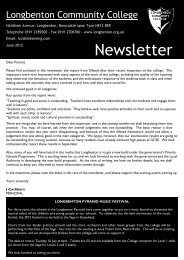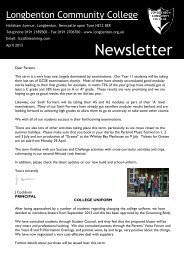Sixth-Form-Prospectu.. - Longbenton Community College
Sixth-Form-Prospectu.. - Longbenton Community College
Sixth-Form-Prospectu.. - Longbenton Community College
Create successful ePaper yourself
Turn your PDF publications into a flip-book with our unique Google optimized e-Paper software.
George Stephenson High School • <strong>Longbenton</strong> <strong>Community</strong> <strong>College</strong> • Seaton Burn <strong>College</strong>ASBiologyASChemistryQualification and exam board: AS/A2 GCE, AQAWhat will I learn?YEAR 1:Firstly we look at how digestive and gasexchange systems may be affected bycommunicable and non–communicablediseases. How knowledge of basic biologyallows us to understand the symptoms ofdisease and interpret data relating to riskfactors. We then move on to look at theinfluence of genetic and environmentalfactors on intraspecific variation. Howthe variety of life is reflected in similaritiesand differences in its biochemical basis and cellular organisation. How size andmetabolic rate affect an organism’s requirements and gives rise to adaptations.YEAR 2:This year we look at how living organisms form ecosystems through whichenergy is transferred and chemical elements cycled. How human activity affectsecological balance in a variety of ways. How genetic variation and isolationmay lead to the formation of new species. We then move on to look at stimulusand responses-the biology of the nervous and endocrine systems, homeostasisand the maintenance of a constant internal environment, genes and geneticexpression.How will I be assessed?Units 1, 2, 4 and 5 are tested by written papers. Units 3 and 6 are assessedinternally then moderated externally.Further informationThere is a Field Study in Year 12 for those going on to take the full A Levelqualification. We use the AQA endorsed text book written by Glenn Toole andSusan Toole, published by Nelson ThornsQualification and exam board: AS/A2 GCE, AQAWhat will I learn?YEAR 1:The AS units are: Unit 1: Foundation Chemistry Topics covered include atomicstructure, bonding, structure of the periodic table and the massspectrometer.Unit 2: Chemistry in action Topics covered include collision theory, metalsextractions and redox reactions.Unit 3: Internally assessed investigative and practical skillsThis is the ‘coursework component’.YEAR 2:The A2 units are:Unit 4: Kinetics, equilibria and organic chemistry Topics covered include acids andbases, polymers and amines.Unit 5: Energetics, redox and inorganic chemistry Topics covered includetransition metals, thermodynamics and periodic trends.Unit 6: Internally assessed investigative and practical skills This is the ‘courseworkcomponent’How will I be assessed?Units 1, 2, 4 and 5 are examined by writtenpapers which may be taken in June. Units 3 and 6 are assessedinternally as part of the course.Further informationChemistry students learn to see the world differently. A Level Chemistryrequires an interest in the subject, but also the ability to think creatively! A goodimagination enables you to picture the abstractconcepts studied. You will study the impact of chemical processes on theenvironment. You should have good communication skills to enable you tocontribute ideas, opinions and thoughts. A good grasp of Maths and the ability towork with precision and accuracy is important, especially in practicals.50





